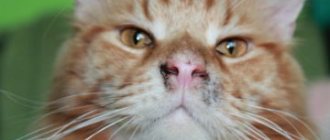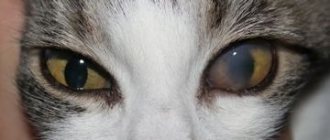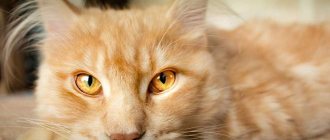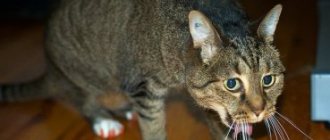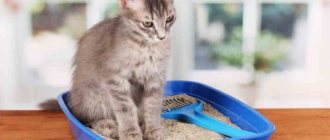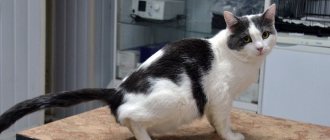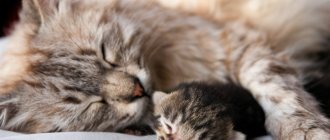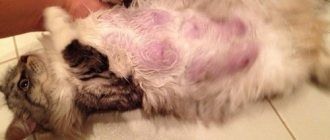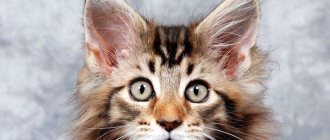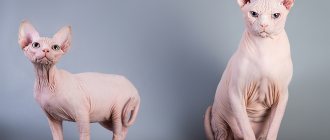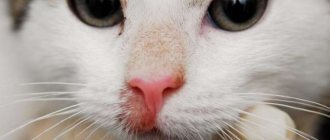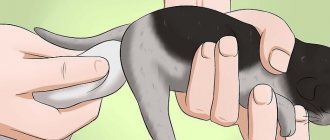Hello, dear visitors of our blog!
“Little children are little troubles...” This may be true, but only relatively, because sometimes you don’t know what to do and where to run for help if a “trouble” comes, the consequences of which can be quite significant! For example, if a kitten is vomiting and diarrhea.
Why does the mechanism of rapid release of the gastrointestinal tract in the event of an “accident” not always save? Because while the digestive tract of baby animals is developing, it cannot cope with some of the difficulties that arise. But the cat owner must be able to distinguish minor circumstances from obvious signs of ill health.
Causes of diarrhea in a kitten
There may be several reasons that cause the development of diarrhea in kittens:
- Dietary disorders. This situation arises in cases where the kitten is fed from a common table, the same food that the owners themselves eat. It is strictly forbidden to give: meat that has not undergone heat treatment, salads, soups and any smoked and salted foods. A sudden change in diet can lead to disruption of digestion and, as a result, the development of diarrhea and vomiting. Such a reaction may also occur when switching from mother's milk to "adult" food as a result of stress. Read about premium food for kittens.
- Helminthic infestations can provoke disturbances in the gastrointestinal tract and the development of diarrhea.
- Viruses and bacteria, when they enter a kitten’s fragile body, provoke diarrhea. Teenage kittens are more often susceptible to such conditions.
- Chemical poisoning.
- Moving to new owners is very stressful for the baby. Some kittens develop diarrhea as a result.
Also read about diarrhea in adult cats.
Causes
Diarrhea in a kitten appears several times more often than in adults. What is the reason?
Among the factors contributing to this are:
- Imperfect formation of the digestive system of small kittens.
- Rapid growth and development of the body.
- I still have a weak immune system.
Reasons that can cause diarrhea in kittens include:
- Viral and bacterial infections.
- Poisoning with any chemical substance.
- Worm infestation.
- Changing your diet. This is usually the time when a small kitten comes to a new home. If owners are unfamiliar with the methods of raising cats, problems may arise with proper nutrition of the animal. To begin with, the kitten will be fed everything or even given food that will not be fully absorbed in the small body. Then the grown-up baby will begin to beg for tasty morsels, which inevitably leads to overeating and, as a consequence, to diarrhea.
- Worms - most kittens have these parasites to one degree or another. A baby can become infected from mother's milk, and worms are also transmitted to kittens through fur and from each other. And over time, parasites will begin to enter the body of older cats with adult food, on the street, from fleas.
Kittens have a very sensitive gastrointestinal tract, so you should not suddenly change their diet, especially if low-quality food was used. The stress kittens may experience when moving can also cause distress.
Features of diarrhea in kittens
With severe diarrhea, the kitten’s body loses a large amount of fluid and minerals, and therefore dehydration may develop, which is dangerous for a fragile baby. It is imperative to treat this condition and not wait for it to go away on its own.
If your pet feels well and is still cheerful and active, it is not necessary to see a veterinarian; you can try to cope on your own. But it is worth remembering that if you have intestinal problems and behavioral disturbances (lethargy, sleeps a lot and plays little), you should definitely consult a veterinarian.
Basic principles in treating diarrhea at home:
- It is necessary to remember what new foods have been added to the diet in the last few days, as they may be the cause of diarrhea. It is also worth giving up milk and sour milk, food from the common table. It is necessary to provide special food for kittens according to their age.
- New foods should be introduced into the diet in microdoses and no more than one every few days. After looking at the animal's reaction and making sure that there are no unnatural consequences, gradually increase the amount of new food.
- Put all food out of reach, as even small kittens can jump to quite high heights and eat food left unattended.
- Limit the amount of food you eat, but make sure your pet always has fresh drinking water available. Often, during illness, animals completely refuse to eat, but drink large amounts of liquid, thereby normalizing their water balance.
- It is imperative to carry out regular wet cleaning in the apartment, especially in hard-to-reach places where cats like to hide.
- When choosing a detergent, pay attention to safe, biodegradable ones. They do not contain chlorine or other substances hazardous to the animal’s body.
- During illness, treat your pet more carefully, play only when he shows interest, and try not to disturb him again.
First aid for adult cats and kittens
If the disorder is not accompanied by a frequent urge to defecate in the animal and does not cause the animal to refuse water and drink, specific treatment is not required. The pet is left on a starvation diet for a day. At the same time, he must have access to drink. You can give him a water infusion of oak bark or a decoction of chamomile.
If the problem is caused by eating spoiled food, it is advisable to give the animal activated carbon at the rate of 1 tablet per 10 kg of weight. You can treat a cat at home with Smecta. You need to dilute 1 sachet of the product in 50 ml of warm water and feed the animal with this mixture.
On the 2nd day after diarrhea, you can give the kitten food that does not put a strain on the digestive organs. If the Maine Coon's condition does not improve within 2 days, you must contact the veterinary clinic to examine the animal and prescribe special treatment.
Features of diarrhea in purebred kittens
Experts have identified a pattern that outbred or mixed breed kittens have better health and stable immunity compared to purebred artificially bred felines.
For example, British and Scottish kittens have an extremely sensitive gastrointestinal system. Therefore, you should be careful about their diet.
British kitten
Features in helping purebred kittens with diarrhea:
- Organize a specific place for the kitten where he feels protected. Try not to pick him up again and ensure complete peace: do not pester him with games and prohibit small children (if there are any in the family) from squeezing the kitten.
- If diarrhea begins, stop all feedings for 10-12 hours, and a bowl of clean drinking water should always be available in an accessible place to avoid dehydration.
- After diarrhea stops, start eating with small doses. It is better to underfeed than to overfeed, as excess food can lead to the recurrence of diarrhea.
- You should refuse ready-made food for the recovery period. Allowed for feeding: hard-boiled chicken egg yolk, a little lean boiled meat, for example, chicken breast, oatmeal or rice porridge, diluted with meat broth.
- Fermented milk products, milk and fish are completely excluded from the diet.
Vomiting and diarrhea
If diarrhea is also accompanied by vomiting, it is necessary to urgently show your pet to a veterinarian, as this is an alarming sign indicating a serious illness. In case of untimely or incorrect treatment of a kitten, complications and deterioration of the condition may develop, even death.
If the animal is in serious condition, it is better to contact an emergency veterinarian and call a doctor at home. He will conduct the necessary diagnostic tests and prescribe treatment.
In addition to the medications prescribed by the veterinarian, it is necessary to disinfect household items: a bowl, a bed, pet toys; Organize a quiet place for the kitten to rest, place a bowl of clean water nearby and change it as needed. In especially severe cases, give the kitten a little sweetened water from a syringe to restore the acid-base balance.
Veterinarian help
The veterinarian examines the animal, prescribes tests and necessary examinations. These may include general and biochemical blood tests, tests for viral infections, and laboratory examination of stool. If a foreign body is suspected, an x-ray, ultrasound or endoscopy is performed.
In addition to bloody vomiting, additional symptoms play an important role in making a diagnosis. Therapy is prescribed after the diagnosis is clarified.
Sometimes the diagnosis is delayed; not a single device detects the foreign object. Then, in a hospital setting, veterinarians can provide supportive therapy until the foreign body comes out naturally or surgery is performed to remove it.
If the bleeding does not stop, droppers with medicinal solutions and injections are prescribed so that the pet does not die from dehydration or large blood loss.
If blood loss is caused by an underlying serious illness, then both the root cause and the consequence need to be treated under the supervision of a veterinary specialist. Your cat may be diagnosed with kidney disease, which is often accompanied by vomiting, diarrhea, loss of appetite, and other symptoms.
When diagnosing various pathologies associated with vomiting in animals, only a veterinarian can tell you what to do to treat them and prevent complications.
Why is diarrhea dangerous in kittens?
The main danger of diarrhea is the onset of dehydration and intoxication of the kitten’s body. These two conditions are the leading causes of death. Along with liquid stool, microelements, vitamins and other useful substances necessary for the normal functioning of the body are washed out of the animal’s body. As a result, the acid-base balance is disrupted, which provokes malfunctions in the functioning of internal organs and systems. At the same time, the kitten’s activity sharply decreases, it becomes lethargic and stops playing.
These are extremely alarming signs, and if detected, you should immediately consult a specialist.
By the color of the stool you can determine the cause of diarrhea:
- The yellow color of stool can be caused by: severe poisoning, blockage of the bile ducts, congenital or acquired (chronic) liver pathology. In acute pancreatitis, the color of the feces is bright yellow.
- Green color indicates dysbacteriosis: as a result, the normal microflora of the kitten’s intestines is replaced by pathogenic ones. This is typical during long-term antibiotic therapy or consumption of stale foods.
- White – bilirubin, bile acids and bile itself are responsible for the color of stool. When the ducts that remove it are blocked, these substances do not enter the intestines, which leads to discoloration of feces. This condition is extremely serious and requires immediate treatment, often surgery.
- The presence of blood in excrement indicates damage to the lower parts of the digestive tract: large or small intestine; black color indicates damage to the upper parts: esophagus, stomach, duodenum. The most common cause of such situations is traumatization by foreign bodies, for example, fish, tubular chicken bones.
- The appearance of mucus and putrid odor from feces indicates the presence of helminths in the kitten’s body.
- Diarrhea with water without the presence of any impurities (blood, mucus, etc.) is not a consequence of a pathological process, but occurs due to excessive consumption of liquid.
Kitten treatment
First, the doctor will prescribe symptomatic treatment, then adjust it depending on the research results:
- An intravenous catheter will be placed to administer medications. In case of severe dehydration and weakness, they can start by administering medications subcutaneously and intramuscularly.
- The antiemetic drug Sereniya is administered subcutaneously.
- Infusor therapy with saline solution.
- Antibiotic therapy, for example, Ceftriaxone.
- Frequent feeding in small portions.
- Hemostatic.
- Blood transfusion if the number of white or red blood cells is critically reduced.
- Deworming and antiprotozoal therapy in case of parasites.
Watch the video: Smecta. Is Smecta allowed for dogs/cats? How to breed smecta?
Symptoms requiring veterinary intervention
There are signs that, if you notice them in your pet, you should immediately consult a veterinarian, or better yet, call them at home, so as not to further aggravate the kitten’s condition:
- blood in excrement;
- frequent and profuse diarrhea;
- a large amount of mucus in the stool;
- constant meowing and restless behavior of the pet, which indicates the pain he is experiencing;
- suspicion of poisoning, for example, insect control was recently carried out in the room where the kitten is located;
- diarrhea continues for quite a long time (more than 20 hours), behavior has changed dramatically: lethargy has appeared, the kitten has stopped playing, sleeps a lot, etc.;
- the occurrence of convulsions or vomiting associated with diarrhea.
Symptoms
If your pet begins to diarrhea, additional symptoms need to be considered. You need to tell your doctor about them - he will more accurately determine the cause of the pathological condition and help the kitten faster. In addition to diarrhea and vomiting, the baby may experience :
- convulsions;
- bloating;
- unpleasant stool odor;
- the presence of mucus or blood in the discharge;
- general weakness and lethargy;
- loss of activity and appetite;
- lacrimation;
- sneezing and coughing;
- change in body temperature;
- discharge from the eyes and nose.
If such symptoms are present, you should not self-medicate. It is better to consult a doctor immediately, because the kitten’s body is not strong enough to cope with the disease on its own.
© shutterstock
Before therapy, it is necessary to examine the pet. His blood and urine samples are taken. Such studies are necessary to identify infectious diseases. X-rays and ultrasound will be required in case of suspected pathology of internal organs. An analysis of vomit and feces is required.
Treatment of diarrhea depending on symptoms
There are several main reasons that cause diarrhea, and depending on them the choice of treatment tactics is made:
- Diarrhea resulting from improper feeding and overeating. A small kitten should be given complementary foods very carefully, in small portions, since its digestive system is not yet perfect and vomiting and diarrhea may develop. If such reactions occur, it is worth eliminating the product to which such a reaction occurred and reducing the amount of food consumed.
- Diarrhea with blood - the veterinarian prescribes medications to normalize the gastrointestinal tract, anthelmintics, and antibiotics. If foreign bodies that cause bleeding are detected, they are removed.
- If diarrhea occurs as a result of intestinal dysbiosis, medications are prescribed to normalize the microflora.
- In case of a bacterial infection, antibiotic therapy is prescribed, administered subcutaneously or intravenously.
- An admixture of mucus in the stool indicates a helminthic infestation or the consequences of their treatment - if anthelmintic drugs have recently been given, since the mucus in this case is the undigested remains of helminths.
Diarrhea accompanied by refusal to eat in a very young kitten recently separated from its mother is a common occurrence. It occurs as a result of a stressful situation and does not require specific treatment.
For prolonged diarrhea that threatens dehydration, intravenous drip administration of detoxification drugs and parenteral nutrition agents is prescribed.
Depending on age:
- The development of diarrhea in the newborn state and in the first month of life is most often associated with congenital developmental anomalies or intrauterine infection with infectious diseases. Bad milk in a cat can also cause diarrhea. Due to their early age and immaturity of the body, in most cases, kittens die. This is also due to poor absorption of drugs by an immature body.
- At 2 months of age, diarrhea is most often associated with a change of place of residence. Most kittens are given to new owners, which is very stressful for them. Therefore, when you take your baby into your home, you should be very careful about organizing a place for him, give him the opportunity to get comfortable, and not get bored with games at first. At the same time, do not forget about proper nutrition and try to bring it as close as possible to your usual diet.
- Three-month-old kittens are already grown-up creatures full of energy and curiosity. The main causes of diarrhea at this age are the following: overeating (they cannot yet dose the amount of food they need on their own), eating objects that are not suitable for this (associated with increased curiosity), and deworming.
- At 4 months and older, the causes of diarrhea are the same as in adult cats: stress and diseases of the digestive tract. Having identified the cause of diarrhea, the veterinarian will prescribe treatment in accordance with it.
At home
If rare episodes of diarrhea occur while the kitten is feeling normally, and emergency veterinary care is not required, following simple rules will help your pet:
- organize peace and not disturb the baby again;
- refuse food for 24 hours, followed by dosed meals in small portions;
- ensure constant access to clean water;
- if there is a relationship between the appearance of diarrhea and eating certain foods, completely eliminate these foods from the diet;
- drink a decoction of rice, flax seeds or oak bark;
- in case of increased gas formation, give children's Smecta or Activated Carbon diluted in water, or any other adsorbent approved for use in kittens.
Treatment with drugs
The list of medications prescribed for kittens is not that extensive:
- Activated carbon – used in the absence of additional symptoms other than diarrhea, while maintaining the pet’s good health;
- Smecta - helps with increased gas formation, to consolidate stool. The dosage should be checked with a veterinarian depending on age and condition;
- Enterosgel is a good remedy that helps with all forms of diarrhea;
- Loperamide - should be given in exceptional cases, in accordance with the prescribed dosage;
- Antibiotics are prescribed by the doctor, depending on the infectious agent that caused the diarrhea;
- Enterofuril - approved for use in kittens; it is more convenient to use a suspension.
Nutrition, prevention and care recommendations
To ensure your kitten always feels good, you should use high quality food. When purchasing a kitten, it is advisable to find out the feeding diet from the former owners and follow it in the future. If you change the feeding regimen, it is recommended to do this gradually: each new type of food is introduced in small portions, monitoring the reaction of the kitten’s body.
You should not hope that the disease will go away on its own. Treatment requires a responsible approach.
Feeding kittens with diarrhea
What to feed a kitten with diarrhea? From the first minute after diarrhea is noticed in a kitten, you need to stop feeding it for 12 hours. This does not apply to water. If the baby is too weak and cannot lap water from a bowl on his own, you should give him water from a pipette or bottle and this should be done regularly. After all, dehydration is the worst enemy of a sick animal. You should know that the transfer of a kitten to normal food after a “hungry day” is done gradually. At the same time, they provide non-fat, low-calorie and gentle food. In the first days after illness, you can give chicken broth, kefir, boiled egg, rice porridge with the addition of ground beef or chicken.
Very important! If your treatment does not have the desired effect, but the kitten’s condition worsens, you should seek help from a veterinary clinic as soon as possible.
If the kitten perks up and starts asking for food, then you can give it a small amount of boiled rice, or you can also give the baby kefir to drink. It’s worth limiting ourselves to this for now. The next day, you can add chicken to your recovering kitten’s diet. So, gradually, the baby will return to normal nutrition without harm to the affected stomach. By the way, products such as milk should be excluded from the patient’s menu. The same applies to fatty, fried and smoked foods.
If parasites are detected in your pet, he will be prescribed a specific course of treatment. You will need to follow a medication regimen and a special diet. This treatment is repeated after some time, in accordance with the instructions. If the body is dehydrated, the kitten will be prescribed IV drips: subcutaneously or intravenously. To do this, you will have to take the kitten to a veterinary clinic or you can call a specialist to your home. If diarrhea is caused by an infectious agent, antibiotics are prescribed for treatment.
Care Tips
Viral diseases are one thing. But on the way to a fairly long cat life, many dangers await your pet. Most diseases in cats occur quickly. In addition, cats are secretive creatures and not every owner can immediately determine that something is wrong with their pet.
Therefore, when the kitten’s diarrhea goes away, it’s time to protect its future. Veterinary clinics offer many different vaccines to choose from, some of them even have complex effects. Timely vaccinations are a unique contribution to the health of your pet and great confidence in its safety. Keep in mind that before vaccination, the mustache must first be treated for worms. It would also be a good idea to remove other possible parasites: fleas, ticks. Proper care and prevention is an important aspect for a kitten to live a full life without diarrhea and other troubles. You shouldn't wait for trouble, it's better to prevent it.
Still have questions? You can ask them to our site's in-house veterinarian in the comment box below, who will respond to them as soon as possible.
Nutrition for diarrhea
If there are repeated episodes of loose stools, you should completely exclude the kitten from feeding.
The most optimal time to refuse food is 10-12 hours.
Throughout the “hungry period,” you need to make sure that the kitten always has a bowl of clean water nearby. If the animal is very weak and cannot drink on its own, it is given from a syringe or pipette in small doses at short intervals. This is done to prevent dehydration.
After 12 hours, feeding is resumed in small doses and low-calorie foods. Fermented milk products and milk are excluded from the menu.
Read the article about how long a cat can go without food.
Stool color
With diarrhea, the severity of your pet's illness can be determined by the color of the feces:
- If it is black or even bloody, then this is a signal that a disease such as panleukopenia or enteritis is present. There is also a high chance of internal bleeding. These are extremely serious diseases; without the help of a veterinarian, the animal will probably die.
- Yellow diarrhea occurs due to dysbiosis when helminthic infestations or inflammation of the stomach occur.
- What does it mean if a kitten has green diarrhea? 2 months is still a very young age, but even during this period the baby may experience diarrhea. Green diarrhea and fever are signs of the development of putrefactive microflora. The pet urgently needs to be taken to the clinic so that the necessary antibiotic can be prescribed.
Prevention
- Proper nutrition with special cat food or food prepared separately. Feeding food from a human table is unacceptable.
- Regular cleaning of the animal's tray with disinfectants.
- Timely vaccination and deworming.
- Limiting stressful situations.
- Using detergents that are safe for cats.
It is worth remembering that a timely visit to the veterinarian when the first alarming symptoms occur increases the chances of a favorable treatment for your pet.
